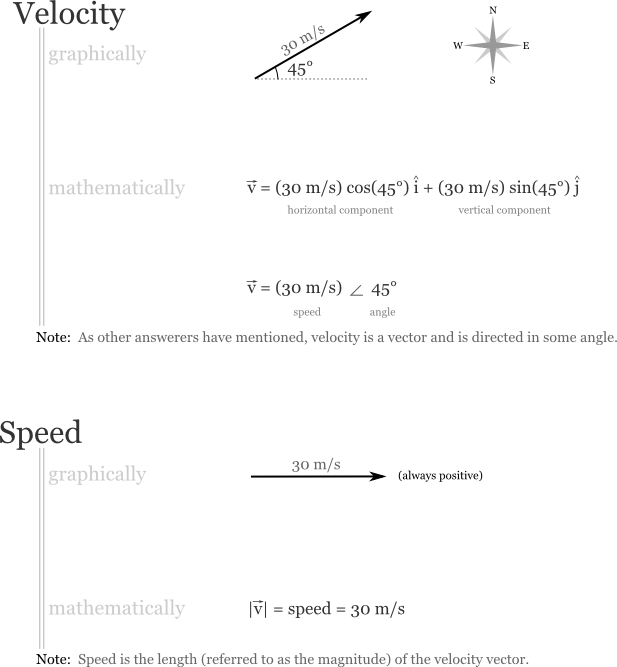What is the difference between velocity and speed?
In meteorological data I found them used like this:
wind velocity: speed including direction
wind speed: just plain speed
What is the difference between velocity and speed?
In meteorological data I found them used like this:
wind velocity: speed including direction
wind speed: just plain speed
Well, I would agree with the meteorological definition, that's the one I was taught in my physics class as well. Wikipedia says:
In physics, velocity is the rate of change of displacement (position). It is a vector physical quantity; both magnitude and direction are required to define it. The scalar absolute value (magnitude) of velocity is speed [...]. For example, "5 meters per second" is a scalar and not a vector, whereas "5 meters per second east" is a vector.
Edit: so much for the difference between velocity and speed, since that is what you are expressly asking for. However, for the sake of completeness, I think I should add that "velocity" and "speed" sometimes are used interchangeably. For example, Merriam-Webster says:
Definition of VELOCITY
1 a : quickness of motion : speed <the velocity of sound>
b : rapidity of movement <[my horse's] strong suit is grace & personal comeliness, rather than velocity — Mark Twain>
c : speed imparted to something <the power pitcher relies on velocity — Tony Scherman>
2 : the rate of change of position along a straight line with respect to time : the derivative of position with respect to time
3 a : rate of occurrence or action : rapidity <the velocity of historical change — R. J. Lifton>
b : rate of turnover <the velocity of money>
Velocity is a vector quantity, which means that it has both a magnitude (aka size) and a direction.
Speed is a scalar quantity, which means that it only has a magnitude.
You can see that the speed is simply the "size" component of the velocity, leaving off the direction information.
Physics makes a distinction between these two words, but in non-physics contexts people don't usually need the distinction or can infer it from context, and thus those words are synonyms. Actually it's not uncommon for technical jargon to assign synonyms to similar concepts in a way that makes them not synonymous anymore.
Examples of speed and velocity as synonyms:
I ran around the block at a high velocity
I ran around the block at a high speed
If you were speaking informally, you could say either word and the sentence would mean the same thing to your listener (note: velocity sounds pretentious to me here). However technically once you've run around the block and returned to your starting point your net velocity is zero because your displacement is zero. A pedantic purist who would insist that "velocity" is incorrect in this sentence should assume that the speaker is simply referring to their instantaneous velocity and not their net velocity. Of course anything which has speed has velocity as well, but usually we just don't care about the direction part.
Velocity is means only the linear displacement, while speed (although not in physics) may refer to other things (like "speed of internet connection", "speed of typing") etc.
From the NOAD:
velocity /vəˈlɑsədi/
noun ( pl. -ties)
the speed of something in a given direction : the velocities of the emitted particles.
• (in general use) speed: the tank shot backward at an incredible velocity.
• (also velocity of circulation) Economics the rate at which money changes hands within an economy.speed /spid/
noun
1 rapidity of movement or action: the accident was due to excessive speed | figurative they were bemused by the speed of events. • the rate at which someone or something is able to move or operate: the car has a top speed of 147 mph.
• each of the possible gear ratios of a bicycle or motor vehicle.
• the sensitivity of photographic film to light.
• the light-gathering power or f-number of a camera lens.
• the duration of a photographic exposure.
2 informal an amphetamine drug, esp. methamphetamine.
3 informal something that matches one's tastes or inclinations: oak tables and chairs are more his speed.
4 archaic success; prosperity: wish me good speed.
In general use, velocity is a synonymous of speed, but in some cases the words have different meanings.

Speed refers to " how fast an object is moving ". Velocity refers to " the rate at which an object changes its position " .
For our sake there is no difference between speed and velocity. They both refer to the rapidity of movement/action